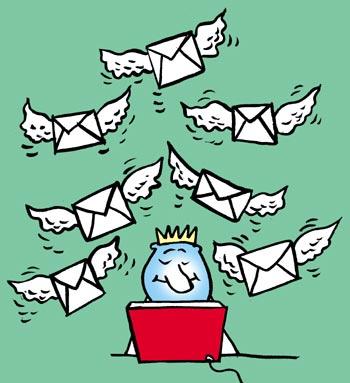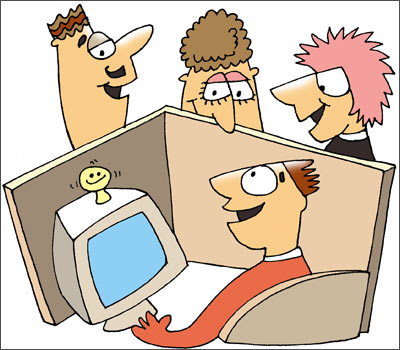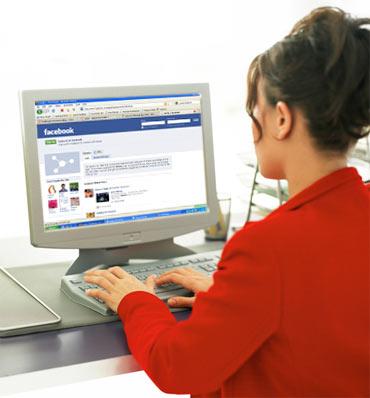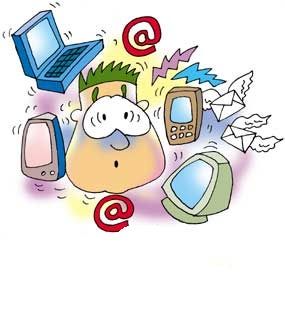
Today's workplace is undergoing a significant transformation thanks to technology, global operations and increasing contribution of knowledge services.
The knowledge workers of today are tech-enabled, on the move and constantly balancing multiple priorities both personal and professional all day long. The line between professional and personal time has ceased to exist for many workers in today's economy. The office itself has become virtual or has moved to the home for a number of people. In such a situation, it has become imperative to be even more sensitive of some codes of conduct," asserts Rajit Anand, vice president Technology, Sourcing and Governance at Pearson.
So what aer the 'rules' of conduct in this transformed work environment? Here are some new codes of etiquette in play:
Breakdown of hierarchy
The steps to the top haven't collapsed, so to say, but have definitely become more visible and amenable. Affirms Anjan Ray, director of Business Development, Honeywell's Specialty Materials SBG, in India, "The easing of the "Sir" and "Ma'am" culture is a significant pointer. It is now more common to address senior colleagues by first name and effectively trim the hierarchy barriers -- not just in MNCs but in many family-owned companies as well."
E-mail fixation
Hrishikesh Pore from Trent Hypermart asserts what should be the ideal method of using official e-mail, especially with increased levels of monitoring of communication at work these days. "E-mail should be strictly for official communication only. Personal communication should be sent using personal internet mail."
Ray also mentions a "somewhat strange effect of e-mail these days. One often tends to mail people in the same office, typically generating long trails and complex debates -- rather than just walking over to the person's workspace and sorting issues out."
*Names have been changed to protect identity.
Preeti Bose heads Learning and Development for an FMCG company in Gurgaon. The views expressed in this article are personal and not of her organisation.

Web-based presentations and meetings
"If you are giving a Web-based presentation, make sure you remind people to log on 5-10 minutes in advance if they have not used this service before. The system checks and client software installations take that much time and often hold people up unexpectedly.
"Also, if you have organised a meeting to discuss ideas or data then send the material out to the participants in advance so that they have a fair opportunity to read and contemplate before the meeting. There is no point sending stuff an hour before the scheduled meeting if you expect people to take decisions based on the content and data," says Rajit.
Increase in 'coffee cluster' culture
The buzz around coffee machines has largely eliminated the 'office boy' concept.
"It creates a social framework for informal chats with colleagues across departments and can be utilised very effectively, if people so want," believes Ray.
Some social butterflies find it irresistible to pull away from such flocks and can be seen spending many otherwise productive office hours in inane conversations. "It will be prudent to remember that coffee machines and water coolers are not meant to be places for hour-long conversations," suggests Pore.

Many more organisations have started to employ and support women, especially when they come back from maternity and other family-induced sabbaticals.
Preeti Bakaya Chopra, senior advisor, India Practise Interel PA, states all the way from Brussels: "Firms need to understand that all women who join them are not going to have a non-committal attitude to their home. A woman will go through her evolution of a wife and a mother, and if they want them to be with the organisation in the long term then it is also critical to display a more meaningful attitude beyond merely ornate HR policies.
"Organisations need to develop a "humane" approach towards their women work force. They are as much a key human asset as other gender and it is about time that firms treated them as such. This includes becoming more receptive to their need for flexibility in working hours post maternity, comfortable workplace where late nights are taken care of in terms of safe transportation back home and a respected and egalitarian office space where they are treated with respect and any issues of gender discrimination are addressed at the earliest."
Open office, phones, YouTube et al
With the increase of cabin-less and wall-less offices, our working style and habits are open to people's interpretations. Most places, Facebook and YouTube are a constant on all machines.
Exercise discretion and try to keep designated small time slots during lunch or coffee breaks for visiting your favourite social networking sites. Also be vigilant of loud ringtones that may be music to your ears but can be annoying for those around trying to get some work done.
Beware of the fact that videos and heavy downloads choke the bandwidth and hamper work.

Almost all organisations the world over have become particular about protecting the environment and are using various platforms to spread awareness about sustainability.
Pore insists that one must "print only if you need to and if you print it, you go pick it. Use double-sided prints by default. Do not print what is not related to work ie photographs on colour printers, newspapers, recipes, e-books, magazines, etc. Also remember to switch off lights, ACs, monitors, computers etc when not in use."
Aby Joseph, an ardent 'Go Green' supporter and HR professional at Wrigley, makes a few pertinent points towards the 'Go Green' initiatives at his workplace. "The font 'Century Gothic' uses the least amount of ink when printed, and this is what we recommend all associates to use as default setting. We shun using paper cups as far as possible and try to educate all around us about carrying less of plastic and more of cloth bags. If your infrastructure can support it, 'cloud computing' can be an extremely significant effort towards reducing e-waste."
Mind your language
It may have been cool sometime back to toss the 'F' word around. These days, it's so passe. Sneha Rastogi*, content designer in an e-learning company, vehemently recommends immediate action against employees who fling the 'F' word casually at those around, unmindful of the gender.
"The entire team, especially the ladies, had complained to the manager about this team member who thinks he is a 'cool dude' when he uses colourful language. He doesn't realise that he actually reeks of filth and none of us want to work with him anymore! We had to put our foot down and insist on his removal from the team as he was a drain on patience and energy."

Rajit sums up the new expectations at workplace neatly by including the ubiquitous conference call that has supplanted the weekly face-to-face office meeting.
"While leading a conference call, make sure you sign on a few minutes before the appointed time. This gives you some time to engage in welcome small talk with other participants who are early, before the real meeting starts. Basics, such as getting on the call on time, being in a quiet place, and if you can't find a quiet place then keeping your phone on mute are given. While speaking from a remote place, you ask the audience if they can hear you clearly. If you are on the move, let the others know that you are doing so and may drop off if you hit a dead zone."
Use of social media
The plethora of social media platforms has suddenly unleashed the desire in some people to share all they possibly can! However, there need to be well-defined peripheries.
"Be sensitive about adding colleagues from work, especially your boss to your "friends" network on social media including LinkedIn. Be sensitive about the information you post online in such scenarios. You may accidentally end up offending your boss or disclosing confidential information," says Pore.
As Rajit puts it, "Gone are the days that companies blocked Internet access. In most workplaces today access to email and social media sites is permitted. While we all like to take short breaks from work to check these out, be reasonable in your usage. Don't use a public social media network to conduct work-related communication with a colleague who sits in the same building. This may also be a security risk for your company!"